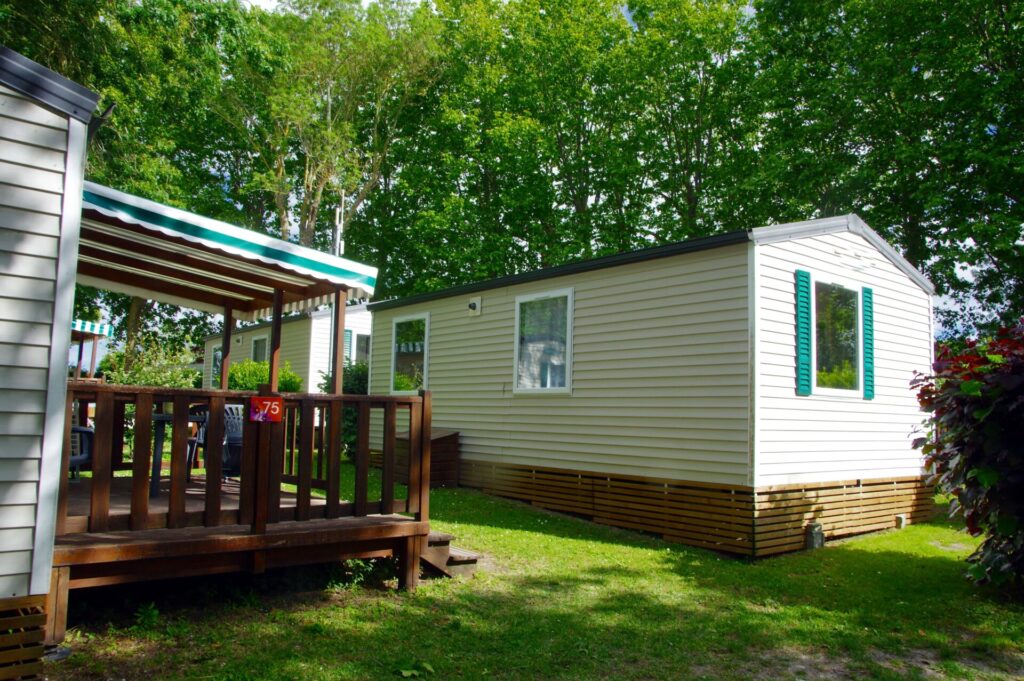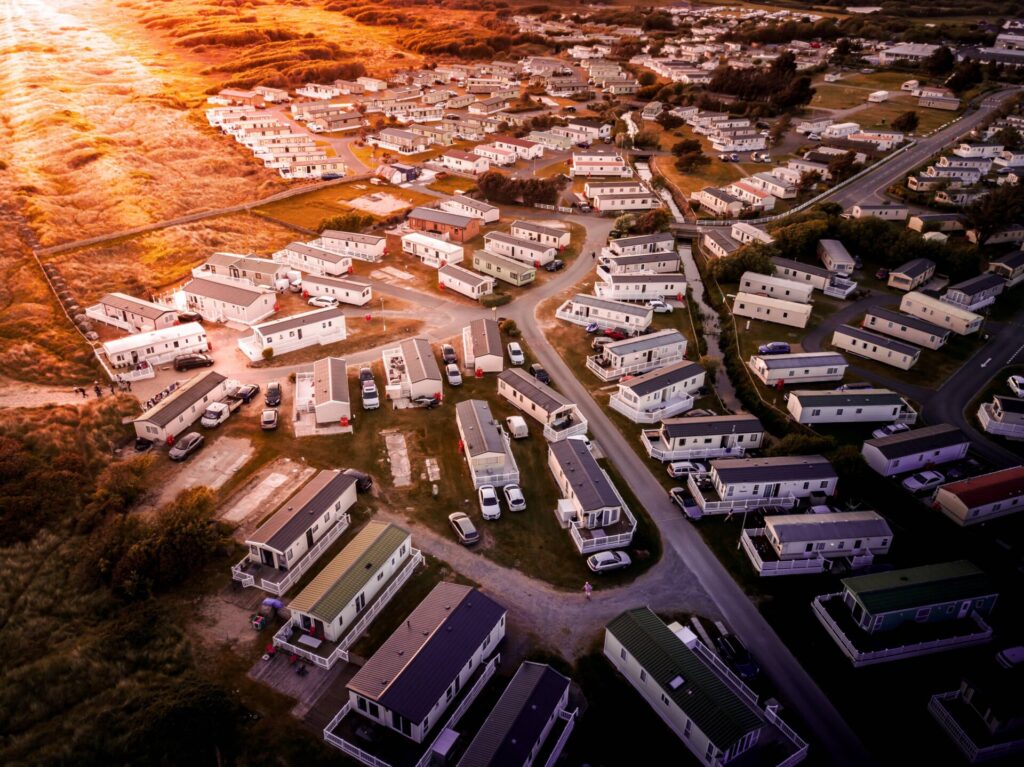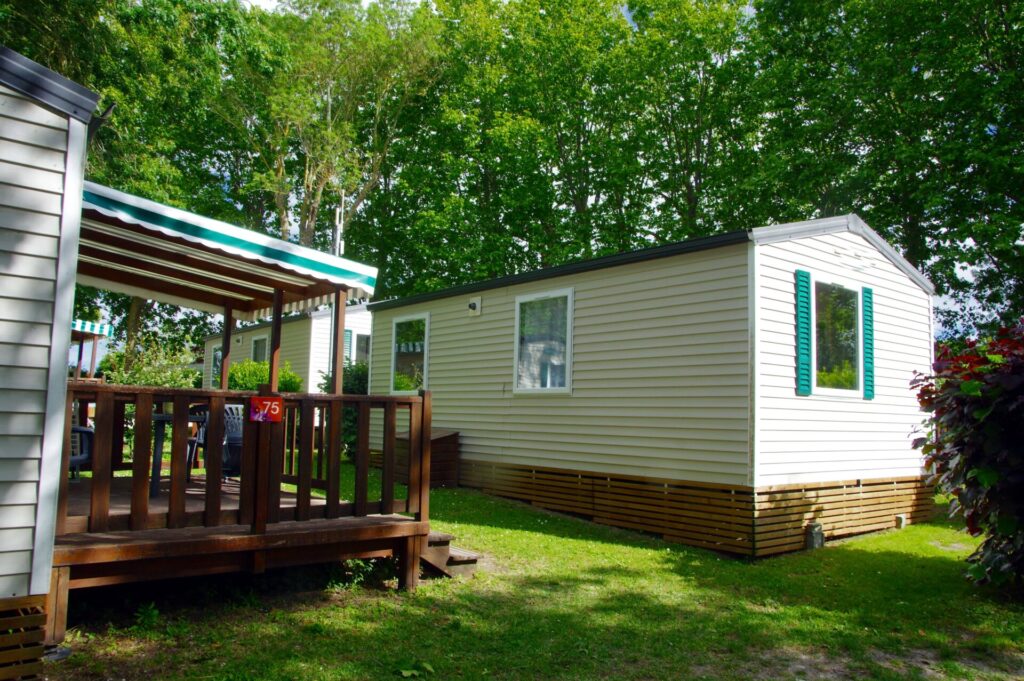Getting Started: An Introduction to Renting and Investing in Mobile Homes
A. Overview of Mobile Homes as a Housing Option
Mobile homes, also known as manufactured homes, have become a popular housing option for many people. These homes are built in a factory and then transported to a designated lot or mobile home park. They offer a unique combination of affordability and flexibility that make them an attractive alternative to traditional site-built homes.
B. Benefits of Renting a Mobile Home
Renting a mobile home has many benefits, including a relatively low cost of living and a spacious, open living environment.
Mobile home communities often have shared amenities such as community centers, playgrounds, and laundry facilities, making it easy to form relationships with neighbors and build a sense of community.
C. Differences between Mobile Homes and Site-Built Homes
While mobile homes and site-built homes may seem similar, there are several key differences between the two.
Site-built homes are constructed on-site and typically have the larger square footage, while mobile homes are built in a factory and transported to their final location. Additionally, the cost of ownership for a mobile home is often lower than that of a site-built home, making it a more budget-friendly option for many people.
Renting a Mobile Home

A. Understanding the Process of Renting a Mobile Home
Renting a mobile home is a straightforward process, but it’s essential to understand the steps involved.
First, you’ll need to find a mobile home park that you’re interested in living in. Then, you’ll tour the park and choose a mobile home that you’d like to rent. Once you’ve made your decision, you’ll sign a lease agreement and pay a security deposit.
B. How to Find a Mobile Home Park
There are many ways to find a mobile home park, including online directories, local classifieds, and real estate websites.
When you’ve found a park you’re interested in, be sure to visit the park and tour the homes to get a feel for the community. It’s also important to research the park’s policies, fees, and lease agreement to make sure it’s a good fit for you.
C. Cost of Renting a Mobile Home
The cost of renting a mobile home can vary greatly depending on the park, the size of the home, and the location.
In general, however, you can expect to pay a monthly rent that covers the cost of the home, as well as a lot rent that covers the cost of living in the park.
Also, you may need to pay for utility services, such as water, electricity, and waste disposal.
D. Lease Agreement and Lot Rent
When you rent a mobile home, you’ll sign a lease agreement that outlines the terms of your tenancy.
This agreement will specify the monthly rent, lot rent, and any other fees that you’ll be responsible for paying. Be sure to read the lease agreement carefully before signing it, and discuss any issues or questions you may have with the park owner or manager.
Additionally, be aware that the monthly rent and lot rent may increase over time, so it’s important to budget accordingly.
Mobile Home Parks

A. Types of Mobile Home Parks
Mobile home parks come in a variety of forms, including all-age parks, 55+ communities, and family parks.
All-age parks welcome residents of all ages, while 55+ communities are designed for older adults. Family parks are geared toward families with children.
When choosing a mobile home park, consider your personal lifestyle and preferences to determine which type of park is best for you.
B. Health and Safety Standards in Mobile Home Parks
Mobile home parks must comply with local, state, and federal health and safety standards. This includes meeting requirements for fire safety, water quality, waste disposal, and building codes.
Moreover, parks must be free from health and safety violations, such as mold, electrical hazards, and structural problems.
C. Inspecting Mobile Home Parks
Before you choose a mobile home park, it’s important to inspect the park to ensure it meets your standards for health and safety.
You can do this by visiting the park, talking to current residents, and reviewing the park’s policies and history of health and safety violations. Additionally, you can work with a municipal building codes officer to get a professional inspection of the park.
D. Choosing the Right Mobile Home Park
When choosing a mobile home park, there are many factors to consider, including location, cost, community amenities, and health and safety standards.
Take your time to research and visit different parks, and don’t be afraid to ask questions and discuss any concerns you may have with the park owner or manager.
By taking the time to choose a suitable mobile home park, you’ll be able to enjoy a comfortable, safe, and enjoyable living experience.
Owning a Mobile Home
A. Cost of Owning a Mobile Home
The cost of owning a mobile home can vary depending on several factors, including the size of the home, the location, and the cost of lot rent.
In general, however, the cost of owning a mobile home is lower than the cost of owning a site-built home, making it a more budget-friendly option for many people.
B. Advantages of Owning a Mobile Home
Owning a mobile home has many advantages, including the ability to build equity, the freedom to make changes to the home, and the sense of stability that comes with homeownership.
Additionally, owning a mobile home allows you to enjoy a sense of community and the benefits of shared amenities, such as community centers, playgrounds, and laundry facilities.
C. Required Government Health and Safety Standards
Mobile homes must comply with federal, state, and local health and safety standards. This includes meeting requirements for fire safety, water quality, waste disposal, and building codes. By ensuring that your mobile home meets these standards, you can ensure the health and safety of yourself and your family.
D. Federal Government Guarantees for Manufactured Homes
The federal government provides several guarantees for manufactured homes, including protection from discrimination and fair housing laws, as well as financial assistance for those who are struggling to pay for their homes.
Moreover, the government provides resources and support for homeowners, including information on health and safety standards, consumer protections, and community resources.
Living in a Mobile Home Community
A. Community Activities and Amenities
Living in a mobile home community offers many opportunities for socialization and community involvement.
Many mobile home parks host community activities such as game nights, potlucks, and holiday celebrations.
Additionally, many parks have shared amenities such as community centers, playgrounds, and laundry facilities that residents can use.
B. Garbage Pickup and Property Maintenance
Living in a mobile home park typically includes access to regular garbage pickup and property maintenance services. These services help keep the park clean and tidy and ensure that residents have access to the resources they need to maintain their homes.
C. Common Facilities and Resources
Many mobile home parks have common facilities and resources that residents can use, such as community centers, playgrounds, and laundry facilities.
These shared resources help create a sense of community and provide residents with opportunities to socialize and form relationships with their neighbors.
D. Local Government Regulations and Codes
Mobile home parks must comply with local government regulations and codes, which may include requirements for fire safety, water quality, waste disposal, and building codes.
Furthermore, local government agencies may provide resources and support for mobile home residents, such as information on health and safety standards, consumer protections, and community resources. By familiarizing yourself with these regulations and resources, you can ensure that you’re informed and prepared for life in your mobile home community.
Advantages of Renting a Mobile Home

A. Relatively Low Cost of Rent
Renting a mobile home can be a budget-friendly alternative to traditional apartment rentals. In general, the cost of rent for a mobile home is lower than the cost of rent for a traditional apartment, making it a more affordable option for many people.
B. More Space than Apartment Rentals
Mobile homes typically offer more space than apartment rentals, providing residents with a spacious and open living environment. This extra space can be especially beneficial for families with children or for those who simply value a larger living space.
C. Personal Property and Own Space
Renting a mobile home provides residents with the freedom to personalize their living space and make it their own. This includes the ability to decorate the home, plant a garden, and enjoy the peace and quiet of their own private property.
D. Fresh Air and Open Living Environment
Mobile homes are typically situated in parks or communities with open spaces and fresh air. This can be especially beneficial for those who enjoy outdoor activities or simply value a healthy living environment.
Additionally, the open living environment of a mobile home can provide residents with a sense of freedom and spaciousness that is not typically found in traditional apartment rentals.
Risks of Renting a Mobile Home
A. Monthly Rent Increases
Like all rental properties, the cost of renting a mobile home may increase over time. This can include increases in monthly rent, lot rent, and any other fees you’re responsible for paying. To mitigate the impact of rent increases, it’s important to budget accordingly and be aware of any changes to your lease agreement.
B. Health and Safety Issues
While mobile homes must comply with local, state, and federal health and safety standards, there is always a risk of health and safety issues arising.
This can include problems with the home itself, such as mold or electrical hazards, or issues with the park, such as health and safety violations. To minimize the risk of health and safety issues, it’s important to research the park and inspect the home before you move in.
C. Additional Fees and Maintenance Costs
In addition to monthly rent and lot rent, you may be responsible for paying additional fees and maintenance costs when you rent a mobile home.
This can include utility costs, property maintenance costs, and any other fees outlined in your lease agreement. To manage these costs effectively, it’s important to budget accordingly and be aware of all fees and costs associated with your rental.
D. Following Park Rules and Regulations
When you rent a mobile home, you’ll be expected to follow the rules and regulations of the park. This can include restrictions on personal property, requirements for garbage pickup, and rules for using shared amenities.
To ensure a positive living experience, it’s essential to familiarize yourself with the rules and regulations of the park and follow them carefully.
Final Thoughts: The Benefits and Considerations of Renting and Owning a Mobile Home
A. Final Thoughts on Renting and Investing in Mobile Homes
Renting or investing in a mobile home can be a great housing option for those who are looking for a budget-friendly, spacious, and community-oriented living experience.
Whether you’re looking to rent or own, there are many factors to consider, including cost, health and safety, community amenities, and local government regulations. By doing your research and taking the time to choose the right mobile home and park, you can enjoy a comfortable and enjoyable living experience.
B. Considerations for Mobile Home Living
When considering mobile home living, there are several important factors to consider, including cost, health and safety, community amenities, and local government regulations. Additionally, it’s important to research different parks and homes to find the best fit for your needs and budget.
C. Tips for Renting a Mobile Home
When renting a mobile home, there are several tips to keep in mind, including:
· Research different parks and homes to find the best fit for your needs and budget.
· Inspect the home and park before you move in to ensure that it meets your standards for health and safety.
· Read your lease agreement carefully and discuss any questions or concerns with the park owner or manager.
· Familiarize yourself with the rules and regulations of the park to ensure a positive living experience.
D. Potential for Mobile Home Living to be a Good Investment
For those who are looking to invest in a mobile home, it’s important to consider the potential for mobile home living to be a good investment. This can include building equity, enjoying a sense of stability, and potentially seeing a return on your investment if you choose to sell the home.
Additionally, mobile home living can be a more budget-friendly alternative to traditional homeownership, making it a potentially attractive option for many people.
Frequently Asked Questions
Typically, mobile home rent is paid on a monthly basis to the park owner or manager. The specific process for paying rent will depend on the park and the rental agreement you have signed. Some parks may require rent to be paid in person, while others may accept online or automatic payments. Be sure to review your rental agreement and ask the park owner or manager for more information on the payment process.
The cost of a mobile home rental typically includes monthly rent for the home and lot rent for the space it sits on. Additional costs may include utility fees, property maintenance fees, and any other fees outlined in your rental agreement. Be sure to review your rental agreement carefully and discuss any questions or concerns with the park owner or manager.
Yes, you can rent out your mobile home. However, you’ll need to comply with local, state, and federal laws, as well as any rules and regulations set by the park. Additionally, you’ll need to sign a rental agreement with your tenant and ensure that the home meets all health and safety standards.
The responsibility for maintenance and repairs of the mobile home will depend on your rental agreement. Some rental agreements may require the tenant to take care of all maintenance and repairs, while others may require the park owner or manager to take care of these tasks. Be sure to review your rental agreement carefully and discuss any questions or concerns with the park owner or manager.
Mobile home lot rent is the fee you pay for the space your mobile home sits on. This fee is typically paid on a monthly basis and is separate from the monthly rent for the home itself. The cost of lot rent can vary depending on the park and the location of the home.
You can choose to rent either an individual mobile home or a space in a mobile home park. Individual mobile home rentals are typically owned by private individuals, while mobile home parks offer spaces for rent in a shared community. The choice between the two will depend on your personal preferences and budget.
Owning a mobile home has many advantages, including the ability to build equity, the freedom to make changes to the home, and the sense of stability that comes with homeownership. Additionally, owning a mobile home allows you to enjoy a sense of community and the benefits of shared amenities, such as community centers, playgrounds, and laundry facilities.
